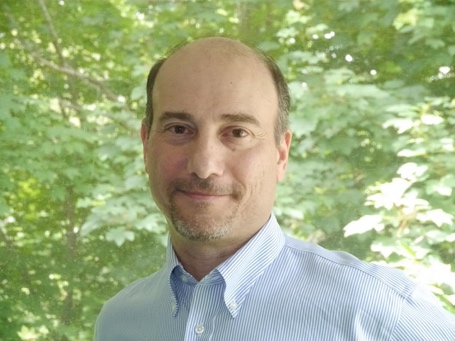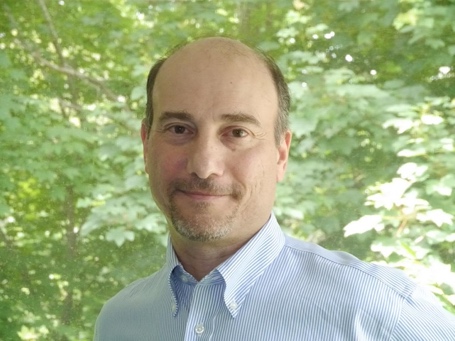Solving Combinatorial Optimization Problems Stochastic Magnetic Tunnel Junctions

The second part of my talk will focus on stochastic magnetic tunnel junctions based on perpendicular magnetic tunnel junctions. In contrast to superparamagnetic MTJs, we experiment with magnetically stable perpendicularly magnetized MTJs (pMTJs) and actuate them with nanosecond pulses to make them behave stochastically. We denote this a stochastic magnetic actuated random transducer (SMART) pMTJ device because a pulse generates a random bit stream on-demand, much like a coin flip [2]. SMART-pMTJs produce truly random bit streams at very high rates (>100MHz) [3], while being more robust to environmental changes, such as their operating temperature and device-to-device variations, compared to other stochastic nanomagnetic devices [4,5]. By interfacing a SMART-pMTJ to an FPGA, we have generated over 1 trillion bits at rates greater than 100 MHz that pass multiple statistical tests for true randomness, including all the NIST tests for random number generators with only one XOR operation [6]. Finally, I will discuss opportunities to advance the science and applications of stochastic MTJs toward creating better sources of random numbers and addressing complex optimization problems.
[1] Dairong Chen, Andrew D. Kent, Dries Sels and Flaviano Morone, “Solving combinatorial optimization problems through stochastic Landau-Lifshitz-Gilbert dynamical systems,” arXiv:2407.00530
[2] L. Rehm, C. Capriata, S. Misra, J. Smith, M. Pinarbasi, B. Malm, and A. D., Kent, “Stochastic magnetic actuated random transducer devices based on perpendicular magnetic tunnel junctions,” Phys. Rev. Appl. 19, 024035 (2023)
[3] Ahmed Sidi El Valli, Michael Tsao, J. Darby Smith, Shashank Misra, and Andrew D. Kent. “High-Speed Tunable Generation of Random Number Distributions Using Actuated Perpendicular Magnetic Tunnel Junctions,” arXiv:2501.06318
[4] L. Rehm, M. G. Morshed, S. Misra, A. Shukla, S. Rakheja, M. Pinarbasi, A. W. Ghosh, and A. D. Kent, “Temperature-resilient true random number generation with stochastic actuated magnetic tunnel junction devices,” Appl. Phys. Lett. 124, 052401 (2024)
[5] Md Golam Morshed, Laura Rehm, Ankit Shukla, Yunkun Xie, Samiran Ganguly, Shaloo Rakheja, Andrew D. Kent, Avik W. Ghosh, "Reduced sensitivity to process, voltage and temperature variations in activated perpendicular magnetic tunnel junctions based stochastic devices," arXiv:2310.18781
[5] A. Dubovskiy, T. Criss, A. Sidi El Valli, L. Rehm, A. D. Kent, A. Haas, "One Trillion True Random Bits Generated With a Field-Programmable Gate Array Actuated Magnetic Tunnel Junction," IEEE Magnetics Letters 15 (2024)
Date and Time
Location
Hosts
Registration
- Date: 13 Jun 2025
- Time: 09:00 AM UTC to 10:01 AM UTC
-
 Add Event to Calendar
Add Event to Calendar
- Campus Artem,
- 2 allée André Guinier,
- Nancy , Lorraine
- France 54011
- Building: Institut Jean Lamour
- Room Number: Alnot 4-A014,
Speakers
Andrew Kent
Biography:

Mohammed Balli
Biography:
Mohamed Balli is Full Professor at International University of Rabat (Morocco), Associate Professor at Sherbrooke University (Canada) & Adjunct Full professor at Mississippi State University (USA). He aims to understand how to particularly make functional materials useful in our daily life such as in clean and efficient refrigeration/heating, hydrogen storage, solar cells, batteries and much more. M. Balli received his master’s degree in Mechanics of Materials from Montpellier II University (2003, France), a second master’s degree in Magnetism from Joseph Fourier University, Grenoble 1 (2004, France) and, a PhD degree (2007) in physics of materials, from Joseph Fourier University, prepared at Néel Institute (CNRS). M. Balli has occupied several academic and research positions in France, Switzerland and Canada. His research work has received numerous awards including, "Rising star researcher award" given by the Research Fund: Nature and Technology, Canada (2014) and the “Research and Innovation Prize 2015” from Sherbrooke University. He is classified at the top 2% scientists in the world by Stanford University (2024).
Email:
Media
| 2024_MAT-PULSE_Seminar__Andrew_Kent_-_June__13th_ | 464.01 KiB |
